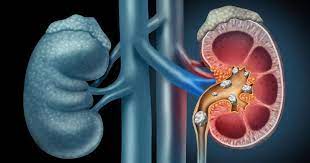Did you know that one in eleven people will develop a kidney stone at some point in their lives? While stones can be painful, there are many ways to treat them. In this blog post, we’ll discuss the different treatment options for kidney stones and how to find the best one for you. We’ll also provide information on what to expect during treatment and how to reduce your risk of developing another stone.
Why do kidney stones form?
Kidney stones are formed when there is an imbalance in the minerals and substances that make up your urine. When this happens, the levels of these substances can become too high or too low, and they can start to crystallize. kidney stones can be made up of different minerals, including calcium, oxalate, uric acid, and cystine.
There are several factors that can contribute to the formation of kidney stones, including dehydration, certain medical conditions, and diet. Dehydration occurs when you lose more fluids than you take in, and it can cause the minerals in your urine to become concentrated and more likely to crystallize. Certain medical conditions, such as kidney disease or urinary tract infections, can also increase your risk of kidney stones.
And finally, diet plays a role in kidney stone formation because certain foods can increase the levels of minerals or substances in your urine. For example, a diet high in salt can increase the level of calcium in your urine, while a diet high in animal protein can increase the level of uric acid in your urine.
Are kidney stones hereditary?
There are a number of different factors that can increase your risk of developing kidney stones, including your diet, dehydration, and certain medical conditions. Some people may also be more susceptible to kidney stones because of their family history.
While there is no definitive answer as to whether or not kidney stones are hereditary, there is some evidence to suggest that they may run in families. One study found that people with a family history of kidney stones were 1.5 times more likely to develop kidney stones themselves.
Are kidney stones dangerous?
If you have kidney stones, you may be at risk for serious complications. kidney stones can block the flow of urine and cause urinary tract infections. kidney stones can also damage the kidney tissue and lead to kidney failure. Kidney stones are a serious medical condition that should be treated by a healthcare professional.
Where do kidney stones get stuck?
There are a few different places where kidney stones can get stuck. The most common place is in the ureter, which is the tube that carries urine from the kidney to the bladder. Kidney stones can also get lodged in the bladder or urethra (the tube that carries urine from the bladder out of the body).
If a kidney stone gets stuck in the ureter, it can block the flow of urine and cause a lot of pain. Kidney stones that get stuck in the bladder or urethra are less likely to cause pain, but they can still cause problems by blocking the flow of urine.
What do kidney stones look like?
Kidney stones are small, hard deposits that form in the kidney. They are usually made up of calcium, but can also be made up of other minerals and substances. Kidney stones can vary in size from a tiny grain of sand to a large pebble. Some kidney stones pass out of the body on their own, but others may require treatment.
If kidney stones are large or cause obstruction, they may need to be removed with surgery. Small kidney stones can often be treated with medications that help break them down or pass them out of the body.
How are kidney stones diagnosed?
Kidney stones are usually diagnosed based on the symptoms they cause. However, imaging tests may be ordered if kidney stones are suspected based on the person’s medical history and physical examination.
Imaging tests for kidney stones include X-rays, computed tomography (CT) scans, and ultrasounds. X-rays can sometimes detect kidney stones, but they are more likely to be seen on CT scans or ultrasounds. CT scans use a combination of X-rays and computer technology to create detailed images of the body, while ultrasounds use sound waves to create images.
Blood and urine tests may also be performed in order to check kidney function and look for substances that may be causing kidney stones. Blood tests can check for kidney function by measuring levels of creatinine and blood urea nitrogen. Urine tests can check for substances that may be causing kidney stones, such as calcium, oxalate, and uric acid.
In some cases, a kidney stone may need to be surgically removed in order to confirm the diagnosis. This is typically done if the kidney stone is large and causing severe symptoms, or if other methods of diagnosis are inconclusive. Surgery to remove a kidney stone is called nephrolithotomy or ureterolithotomy.
Will kidney stones show up in blood work?
There is no specific blood test for kidney stones, but kidney function may be checked with a basic metabolic panel or complete blood count (CBC). Kidney stones may also be detected on an X-ray or ultrasound.
How are kidney stones treated?
There are a number of different treatment options available for kidney stones, depending on the size and severity of the stone. For smaller kidney stones, treatment may simply involve drinking plenty of fluids and taking pain relief medication. For larger kidney stones, more invasive treatments may be necessary, such as shock wave lithotripsy or surgery.
If you have kidney stones, your doctor will work with you to develop a treatment plan that is best for you. Treatment options for kidney stones include:
Drinking plenty of fluids
This helps to increase urine output and flush out small kidney stones.
Pain relief medication
Over-the-counter pain relievers such as ibuprofen or acetaminophen can help to relieve the pain of kidney stones.
Shock wave lithotripsy
This procedure uses sound waves to break up kidney stones into smaller pieces that can then be passed through the urinary tract.
Surgery
In some cases, surgery may be necessary to remove large kidney stones.
Kidney stones are usually treated successfully with no long-term complications. However, in some cases, kidney stones can lead to more serious problems such as kidney damage or infection. If you have kidney stones, it is important to see your doctor for diagnosis and treatment.
What kind of surgery is needed for kidney stones?
kidney stones are one of the most common conditions that urologists treat. In fact, it is estimated that kidney stones affect approximately 1 in 11 people in the United States. While kidney stones can occur at any age, they are most common in adults between the ages of 20 and 49.
There are a variety of surgical options available to treat kidney stones, depending on the size and location of the stone(s). The goal of surgery is to remove the kidney stone(s) while causing as little pain and discomfort as possible.
The most common type of surgery for kidney stones is called ureteroscopy. This procedure involves inserting a thin, flexible telescope (ureteroscope) into the urethra and then up through the bladder into the ureter (the tube that drains urine from the kidney to the bladder). Once the stone is located, a number of different techniques can be used to break it up and remove it.
What is Ureteroscopy?
Ureteroscopy is typically performed as an outpatient procedure, meaning that patients can go home the same day. Recovery times vary, but most people are able to return to their normal activities within a few days.
Another common type of surgery for kidney stones is called percutaneous nephrolithotomy (PCNL). This procedure involves making a small incision in the patient’s back and then inserting a thin telescope (nephroscope) into the kidney through the incision. The kidney stone is then located and removed using a number of different techniques.
What is percutaneous nephrolithotomy (PCNL)?
PCNL is typically performed as an inpatient procedure, meaning that patients will need to stay in the hospital for one or more nights. Recovery times vary, but most people are able to return to their normal activities within a week or two.
Kidney stones can also be treated with extracorporeal shock wave lithotripsy (ESWL). This non-invasive procedure uses sound waves to break up kidney stones from outside the body. Once the kidney stones have been broken up, they are passed through the urinary tract and out of the body in the urine.
What is extracorporeal shock wave lithotripsy?
ESWL is typically performed as an outpatient procedure, meaning that patients can go home the same day. Recovery times vary, but most people are able to return to their normal activities within a few days.
How to treat kidney stones without surgery?
Kidney stones can also be treated with medical therapy. Medical therapy is typically used to treat small kidney stones (less than 5 mm in size) that are not causing any symptoms. The goal of medical therapy is to help the kidney stone pass through the urinary tract on its own.
Medical therapy is typically performed as an outpatient procedure, meaning that patients can go home the same day. Recovery times vary, but most people are able to return to their normal activities within a few days.
Kidney stones can also be treated with dietary changes. Dietary changes are typically used to treat small kidney stones (less than 5 mm in size) that are not causing any symptoms. The goal of dietary changes is to help the kidney stone pass through the urinary tract on its own.
Dietary changes are typically performed as an outpatient procedure, meaning that patients can go home the same day. Recovery times vary, but most people are able to return to their normal activities within a few days.
Kidney stones can also be treated with observation. Observation is typically used to treat small kidney stones (less than 5 mm in size) that are not causing any symptoms. The goal of observation is to monitor the kidney stone and see if it passes on its own.
Observation is typically performed as an outpatient procedure, meaning that patients can go home the same day. Recovery times vary, but most people are able to return to their normal activities within a few days.
How do prevent kidney stones from forming again?
Kidney stones are a common problem that can cause a great deal of pain. If you have kidney stones, you may be wondering how you can prevent them from forming again.
There are a few things you can do to help prevent kidney stones from forming again. First, drink plenty of fluids. This will help to keep your urine dilute and less likely to form kidney stones. Second, eat a healthy diet that is low in salt and animal protein. This will also help to keep your urine dilute and reduce the risk of kidney stones forming. Finally, avoid activities that might put you at risk for injuries, such as contact sports or high-impact exercise.
If you have had kidney stones in the past, it is important to talk to your doctor about ways to prevent them from occurring again. There are a number of treatments available that can help to reduce your risk of kidney stones. With the right treatment, you can enjoy a kidney stone-free life.
Which Doctor treats kidney stones?
Kidney stones are a common condition that can cause pain and discomfort. There are two types of doctors who treat kidney stones: urologists and nephrologists. Urologists are surgeons who specialize in the urinary system, while nephrologists are medical doctors who specialize in kidney diseases.
Urologists
Kidney stones are most commonly treated by urologists. Urologists have the training and experience to provide surgical treatments for kidney stones, if necessary. In most cases, however, kidney stones can be treated without surgery. Urologists can provide medications or other nonsurgical treatments to help break up kidney stones or improve the flow of urine so that kidney stones can pass more easily.
Nephrologists
Nephrologists also treat kidney stones, but they focus more on the medical management of kidney stones. Nephrologists may prescribe medications to help prevent kidney stones from forming or to improve the flow of urine. They may also provide dietary and lifestyle recommendations to help prevent kidney stones from recurring.
If you have kidney stones, your doctor will likely refer you to a urologist or nephrologist. These doctors can provide the treatment you need to relieve your symptoms and prevent future kidney stones from forming.
How can telemedicine help me learn more about kidney stone treatments?
Telemedicine allows you to consult with a medical professional from the comfort of your own home. This can be beneficial if you live in a rural area or if you have difficulty getting to a doctor’s office. You can also use telemedicine to get a second opinion on your treatment options.
Many kidney stone treatments can be done at home, but some may require surgery. Telemedicine can help you learn more about your treatment options and make an informed decision about your care. Talk to your doctor about whether telemedicine is right for you.
Conclusion
Telemedicine can be an excellent way to get the care you need, whether you live in a rural area or have difficulty getting to a doctor’s office. If you are considering treatment for kidney stones, talk to your doctor about whether telemedicine is right for you. Our in-house urologist, Dr. Judit Bonkovic-Oszi and our resident Nephrologist Dr. Juan Jaller Char, MD would be happy to consult with you and provide a personalized review of your treatment options.
BLOG AUTHOR
Dr. Ismail Sayeed
Dr. Sayeed is the Medical Director of ViOS, Inc. He is a deeply committed physician entrepreneur & medical blog writer. While building the global infrastructure of the VIOS Clinic, he is dedicated to educate people on the potential of specialist telemedicine for managing chronic diseases.
Read more about him in his author bio




